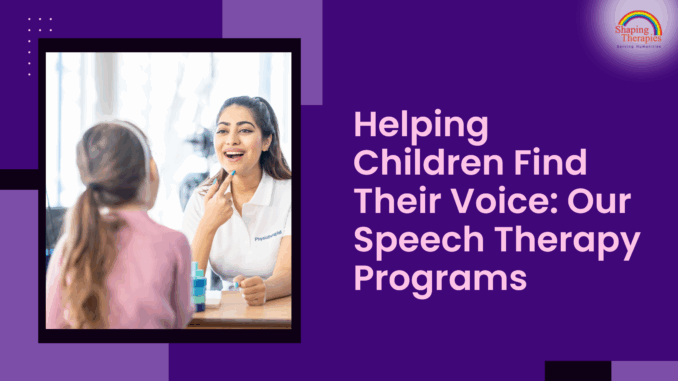
A child’s voice is more than just words it’s how they connect, share, and make sense of the world. When communication doesn’t come easily, it can affect not just learning and relationships, but confidence and emotional well-being. For many parents, noticing delays or challenges in their child’s speech or language can be confusing and overwhelming. That’s where speech therapy becomes a powerful ally offering structured, evidence-based support to help children express themselves with clarity and confidence.
At Shaping Therapies, Thane, we understand how critical communication is to a child’s development. Our speech therapy programs in Thane are tailored to meet the unique needs of each child, making therapy effective, engaging, and family-centered. This guide will walk you through what speech therapy involves, how to know if your child may need it, and what to expect at our clinic helping you make informed decisions for your child’s future.
Understanding the Diverse Needs Addressed by Speech Therapy
Speech therapy covers a wide range of communication issues children may face. These include:
→ Articulation disorders – difficulty saying sounds correctly (e.g., “wabbit” instead of “rabbit”)
→ Phonological delays – issues with sound patterns that affect intelligibility
→ Language delays – difficulty understanding (receptive) or using (expressive) language
→ Fluency disorders – interruptions in flow, such as stuttering or cluttering
→ Social communication challenges – trouble understanding social cues and conversational norms
→ Voice disorders – abnormal pitch, volume, or vocal quality
→ Feeding and swallowing difficulties – if applicable, support is provided for oral motor and safety concerns
Each child’s communication journey is different. Factors like hearing issues, developmental delays, or neurological differences can all impact speech. Early intervention is key to addressing challenges before they affect learning and relationships.
Signs Your Child May Need Speech Therapy
Knowing when to seek help can make all the difference. Here are some signs to watch for:
→ Not speaking as much as peers of the same age
→ Difficulty forming complete sentences or using age-appropriate words
→ Struggling to be understood by others
→ Stuttering or frequent pauses while speaking
→ Challenges following directions or understanding language
→ Avoidance of speaking or signs of frustration while communicating
→ Trouble in social interactions due to communication gaps
→ Persistent hoarseness or unusual voice quality
→ Issues related to eating, chewing, or swallowing
Trust your instincts. If something feels off with your child’s communication, it’s always worth seeking a professional opinion.
How Our Speech Therapy Programs in Thane Help Children Communicate Better
At Shaping Therapies, Thane, our process begins with a comprehensive assessment that includes:
→ Initial consultation with parents to understand concerns
→ Observation of the child during play and structured activities
→ Standardized testing to identify specific speech or language issues
→ Collaborative goal-setting with families
Therapy is personalized and built around your child’s strengths. We use evidence-based techniques that are interactive and enjoyable, including:
→ Articulation therapy using games to practice sounds
→ Language therapy with fun vocabulary-building and storytelling
→ Fluency strategies to reduce stuttering and improve flow
→ Social communication exercises like role play and conversation practice
Therapy sessions are positive, engaging, and tailored to build functional communication skills whether your child is learning to greet a friend, answer a question in class, or express a need clearly at home.
What Makes Our Speech Therapy Approach Unique
→ Child-Centered Environment – Safe, nurturing space where children feel motivated
→ Family Collaboration – We involve parents at every step and provide home strategies
→ Qualified Speech-Language Pathologists – Certified, experienced therapists who specialize in pediatric care
→ Structured Home Programs – Practical activities that extend therapy into daily life
→ Progress Monitoring – Regular updates and goal reviews to track improvement
How to Begin Speech Therapy at Shaping Therapies, Thane
Getting started is simple:
→ Step 1: Book a consultation – Call or visit our website to schedule an appointment
→ Step 2: Undergo a speech and language evaluation
→ Step 3: Receive a personalized therapy plan based on your child’s unique needs
→ Step 4: Begin sessions with a trained therapist, with regular updates and check-ins
Common Questions About Speech Therapy
→ How often will sessions be held? – Typically 1–2 times a week depending on the child’s needs
→ Is speech therapy covered by insurance? – Coverage varies; we can guide you
→ How long does therapy take? – It depends on the severity and goals, but early intervention often leads to faster progress
→ Can I help at home? – Absolutely. We provide home tasks to reinforce learning
Why Choose Shaping Therapies, Thane
At Shaping Therapies, Thane, we combine clinical expertise with compassion, providing:
→ Experienced and certified speech-language pathologists
→ Individualized therapy that grows with your child
→ Focus on real-world communication, not just drills
→ Ongoing collaboration with caregivers
→ Comfortable, child-friendly therapy space
→ Easily accessible location for families in and around Thane
If you’re concerned about your child’s communication skills, don’t wait. Early support can transform your child’s ability to connect, learn, and grow. Call us today to schedule a consultation. Your child’s voice matters and we’re here to help them use it.
Conclusion: Empowering Children Through Communication
Every child deserves the chance to be heard. With the right guidance and support, children struggling with speech or language can develop the tools they need to thrive—both socially and academically. At Shaping Therapies, Thane, we’re proud to support families on this journey, offering proven solutions in a nurturing environment. Let us be your partner in helping your child find their voice.

Leave a Reply